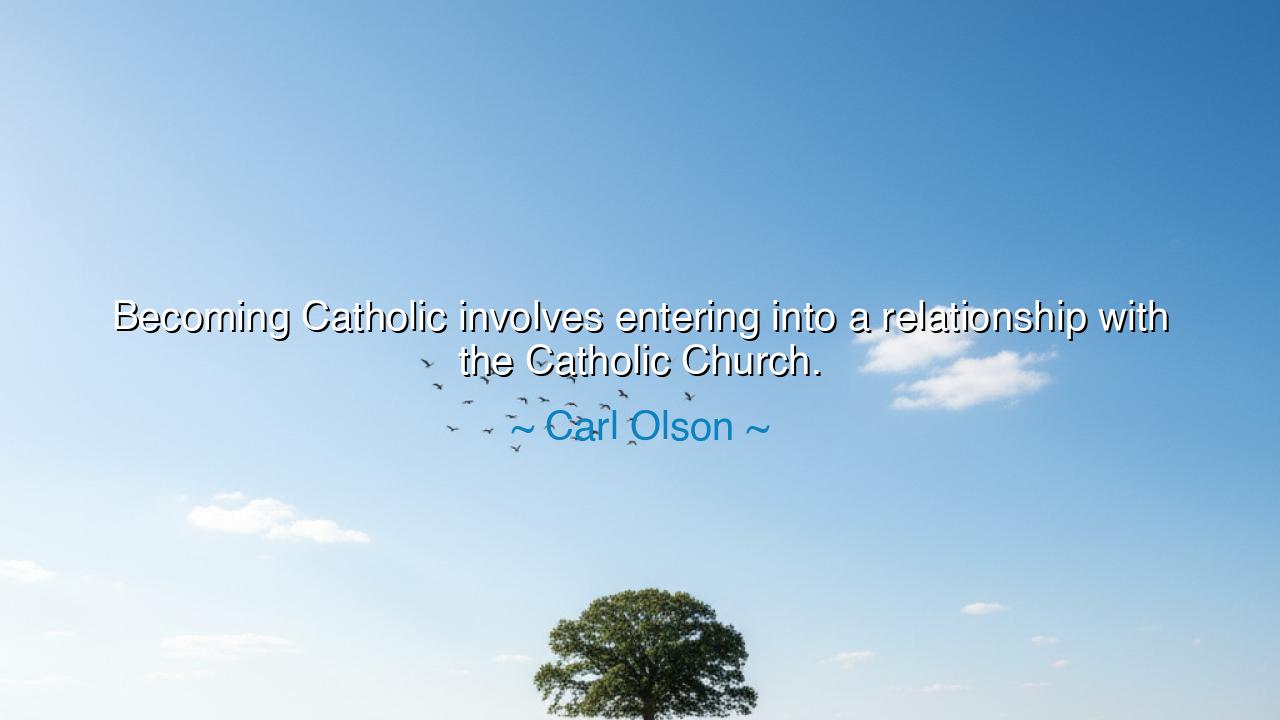
Becoming Catholic involves entering into a relationship with the






Hearken to the words of Carl Olson, who speaks not of mere ritual, nor of an empty badge worn before men. He teaches that becoming Catholic is not the crossing of a threshold alone, but the opening of the heart to communion with a living body. For faith is not solitude, but fellowship; not an idea only, but a bond that ties the soul to the Catholic Church, the Bride and Mother of believers.
To enter into a relationship is to give and to receive, to bind oneself to the joys, the sorrows, the history, and the destiny of the Church. One does not stand apart as a spectator, but walks as a child within a household, sharing its bread, drinking of its cup, and bearing its burdens. Thus, the journey of faith is not isolation but incorporation, not self-rule but shared life in the body of Christ.
The Catholic Church is no mere institution of stone and law, but a living vessel that carries the wisdom of the ages, the blood of the martyrs, the prayers of the saints, and the teachings of the apostles. To join it is to embrace a tradition that stretches beyond the limits of one’s own years, reaching both backward into the dawn of faith and forward into eternity.
Therefore, O seekers, understand: to become Catholic is to step into a covenant far greater than oneself. It is to surrender pride, to be woven into a tapestry not of one thread, but of countless souls bound together in Christ. In this way, Olson reminds us that faith is not simply belief, but relationship—a living union with the Church and, through it, with the Lord who gave Himself for her.






DMVu Duc Minh
Olson’s emphasis on a relationship with the Catholic Church makes me think about how personal relationships with faith communities shape beliefs. But is it possible for someone to maintain a relationship with the Church without fully embracing every aspect of its doctrine? In an age of individual spirituality, how does the institutional structure of Catholicism fit into someone’s personal faith journey? Can one be a good Catholic without fully accepting the institution’s authority?
HLThanh Huy Leli
The idea of entering into a relationship with the Catholic Church, as Carl Olson puts it, seems to make faith feel more relational than doctrinal. It makes me think about how other religious paths view their relationship with the institution. Can a relationship with the church be a transformative experience, or does it create challenges when individuals feel disconnected from the church’s teachings? How can the church make its relationship more personal and less institutional for those seeking a genuine connection?
NANguyen Tran Ngan An
Carl Olson’s perspective that becoming Catholic involves a relationship with the Church highlights the importance of community within religion. It’s not just about personal beliefs but about being part of something larger. How does this sense of belonging influence one’s faith journey? Is the church a place for spiritual growth, or can someone have a strong Catholic identity even without regular involvement in the Church community? What role does the institution play in shaping faith?
LLle linh
Olson’s view of becoming Catholic as entering into a relationship with the Church gives the process a deeply personal dimension. But what does this mean for someone who might be drawn to Catholic teachings but struggles with the institution itself? How can one navigate the tension between personal faith and institutional affiliation? Can the relationship with the Church ever truly be separate from its traditions and hierarchy, or are they inseparable?
NLNgo Le Ngoc Loi
I find it interesting that Carl Olson emphasizes the relationship with the Church in becoming Catholic. It makes me wonder, how much of religious identity is tied to the community and structure of the institution, versus a personal relationship with God? Can someone be deeply spiritual without fully embracing the Church, or is the institutional relationship essential to the Catholic experience? What does that relationship look like in a modern, individualistic world?